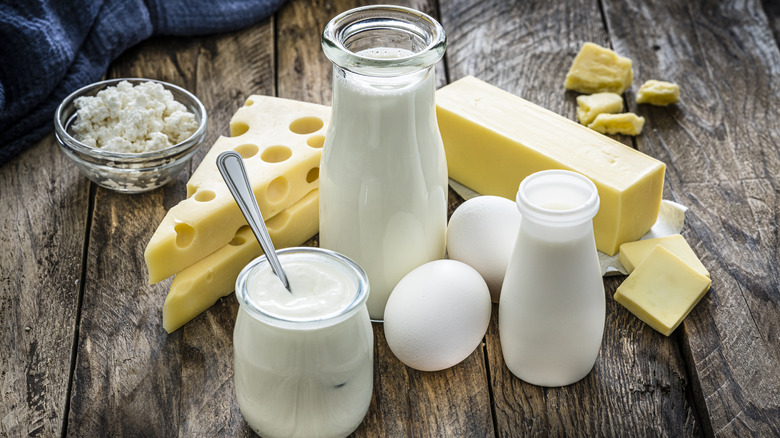Why Your Body Needs Carbs When You Have An Upset Stomach
Your digestive system works hard every moment of every day to help break down food and convert it into energy. Yet sometimes, certain foods and drinks won't go so nicely once they hit your stomach. An upset stomach can come on quickly, and you may feel a sense of fullness even while you're still eating. You might also suffer bloating, discomfort, or a burning sensation in your upper abdomen (via Mayo Clinic).
An upset stomach might be the result of late-night eating or eating your food too quickly. You could also have a food intolerance that could cause an upset stomach. A virus might cause your stomach or intestines to experience some inflammation. Are you on a keto diet? The high-fat, low-carb diet requires your liver to produce extra bile, which can wreck your digestive system (via Medical News Today). Even if your diet swears off carbs, certain carbs might alleviate your upset stomach because they can easily digest and soak up any excess acid.
Types of foods to eat when you have an upset stomach
Although simple carbs can spike your blood sugar, they also don't sit in your stomach for very long. Sure, you've been told countless times to avoid anything with white flour, but your stomach will welcome these foods when your stomach is upset, according to Select Health. You'll want to reach for regular saltines, white bread, and plain white rice. If you've given up these foods and refuse to keep them in your pantry, other foods can help ease your upset stomach.
Bananas can help reduce the acidity in your stomach, and the potassium in a banana can reduce stomach irritation. If diarrhea or constipation accompany your upset stomach, try eating a little bit of applesauce. Ginger can also help soothe an upset stomach, so ginger snaps or ginger ale could help with stomach issues. The University of Wisconsin-Madison suggests drinking small amounts of clear liquids, but make sure to drink them slowly to help your stomach tolerate them. Eventually, you can move on to diluted juices or clear soup broths.
Foods to avoid with an upset stomach
Regardless of the cause of your upset stomach, some foods might make your indigestion worse. The University of Wisconsin-Madison says that spicy or greasy foods might exacerbate an upset stomach. Even though you're told to eat whole grains and raw vegetables for overall health, they aren't the best choice when your stomach is upset. Dairy products like milk, cheese, or ice cream can make your stomach more upset, especially if you have lactose intolerance. You'll also want to avoid alcohol and caffeine when your stomach is sick.
Most stomach issues should resolve within 24 to 36 hours, but see a doctor if you're vomiting or have diarrhea for longer than that. Blood in your vomit or stools is also a warning sign to see a doctor. You should also seek medical attention if you haven't urinated in 8 hours or if your upset stomach doesn't ease up after vomiting or having a bowel movement.
You can avoid an upset stomach by eating smaller meals more frequently and eating them slowly, according to the University of Nebraska-Lincoln. Be sure to stay hydrated as much as possible, and avoid eating late at night. It might also help to include foods high in soluble fiber, such as beans, seeds, apples, and sweet potatoes.


